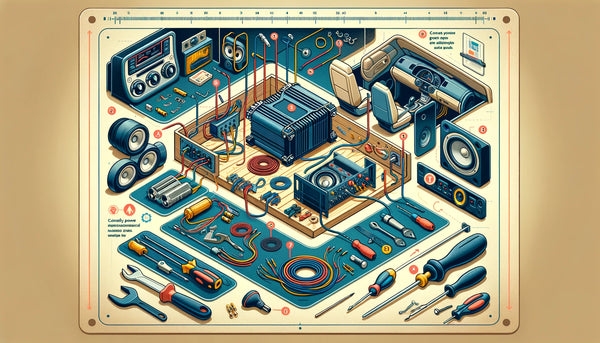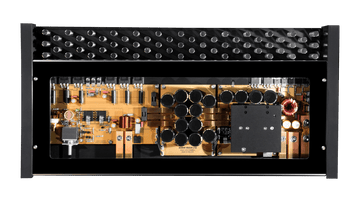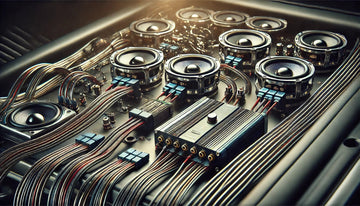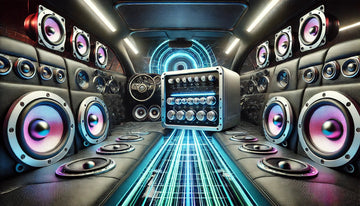Welcome to our car amplifier installation guide, where we will walk you through the easy steps of installing a car amplifier. Car amplifiers are a crucial component of any car audio system, as they increase the power of audio signals, ensuring a premium sound experience. Whether you're a car audio enthusiast or a music lover looking to upgrade your car's sound system, this guide will provide all the information you need to install a car amplifier successfully.
Understanding Car Amplifiers
Car amplifiers, also known as car audio amplifiers, are electronic devices designed to increase the power of audio signals, allowing them to drive speakers and subwoofers efficiently. They play a pivotal role in a car stereo system, enhancing sound quality, bass response, and overall audio performance.
What are Car Amplifiers?
Car amplifiers come in various power options, from single channel to class d full range, catering to different audio system setups. They provide a significant power boost, improving sound quality, bass reproduction, and overall audio performance. Amplifiers are crucial for a high-fidelity audio system setup, delivering a well-balanced sound experience. Most vehicle amps are Class A or Class AB, but we also have a growing selection of Class D amplifiers that are more efficient and produce less heat. A Class D amp is also the best option for low-frequency bass sounds — and their high-end response has dramatically improved in recent years. Are they heading off the beaten path? Marine amplifiers can withstand the harsh conditions of off-roading.
The Role of an Amplifier in a Car Stereo System
Car stereo amplifiers enhance audio signals and create a well-balanced sound system. They power subwoofers, delivering deep bass and a full range of sound frequencies while ensuring a clear, powerful, and distortion-free sound experience. Amplifiers enhance factory car audio systems, elevating sound quality, clarity, and overall audio performance. With our low-price guarantee and free shipping policy, you can easily find a suitable car audio amplifier for your setup at an affordable price.
Why Should You Consider Installing an Amplifier?
Installing a car amplifier is a worthwhile investment for anyone looking to achieve a more dynamic sound with improved bass and clarity. Car amplifiers provide a clean, powerful, and full sound range, optimizing the audio experience for a more immersive sound. Amplifiers elevate sound quality, providing a richer audio experience with enhanced bass, clarity, and performance.
Choosing the Right Car Amplifier
Choosing a suitable car amplifier is crucial to amplify your listening experience and ensure optimal sound quality. A few factors to consider when selecting a car amplifier include power output, channel configuration, and amplifier brand.
Amplify Your Listening Experience
Car amplifiers can elevate your listening experience, adding depth, power, and clarity to your sound system. With a car amplifier, you can achieve a more immersive audio experience, enhancing bass, sound quality, and overall sound performance. Amplifiers bring out the full potential of a car audio system, offering a vibrant sound. Those adding a subwoofer to a factory system will likely need a mono subwoofer amplifier to do what the OEM amp can't.
How Many Channels Should Your Amplifier Have?
The number of channels your amplifier should have depends on your speaker setup. If you're using a subwoofer, a single-channel amplifier, also known as a monoblock amplifier, is suitable for powering a single speaker and is often used to add a subwoofer. A multi-channel amplifier, such as a 4-channel or 5-channel amplifier, is recommended for a full-range setup. Choosing an amplifier with the appropriate channels ensures optimal sound distribution, quality, and performance.
Top Brands in Car Amplifiers
There are several top brands to consider when it comes to car amplifiers. The most reputable amplifier brands include Rockford Fosgate, Alpine, Eton Audio, and Hifonics. These trusted amplifier brands offer high-quality, reliable, performance-driven audio solutions, ensuring a superior, efficient, and durable sound system setup.
Pre-installation Steps for Car Amplifiers
Before installing a car amplifier, there are a few essential pre-installation steps. These steps will ensure a smooth installation process and help you gather all the necessary tools and equipment.
Gathering Necessary Tools and Equipment
To install a car amplifier, you'll need a range of tools and equipment, including wiring, connectors, a wiring kit, power and ground wiring, speaker wire, RCA cables, fuses, a wiring crimper, a screwdriver, a wire cutter, electrical tape, and other accessories. A wiring kit, amplifier mounting hardware, and a wiring harness adapter may also be required. Gathering all the necessary tools, equipment, and accessories beforehand will facilitate a seamless amplifier installation.
Safety Precautions Before Installation
Safety should always be a priority when installing a car amplifier. Before installing, remember to wear protective gear, such as gloves and safety glasses, to avoid any potential injuries. Disconnecting the car battery is crucial to eliminate the risk of electrical mishaps. Ensure you're working in a well-ventilated space to prevent inhalation of harmful fumes and be cautious of sharp edges while working in the car's interior.
Step-by-Step Guide to Car Amplifier Installation

Now that you've gathered all the necessary tools and taken the safety precautions let's dive into the step-by-step guide for car amplifier installation. We'll walk you through connecting the power cable, setting up the ground wire, connecting the speaker wires, and adjusting the amplifier settings.
Connecting the Power Cable
Start by sourcing a dedicated power cable of sufficient gauge to handle your amplifier's power demands. Install a fuse near the car battery to safeguard the power cable from potential electrical issues. Connect the power cable securely to the car battery, ensuring a snug fit and minimal cable exposure. It's essential to ensure a precise, obstruction-free path for the power cable, avoiding potential damage or interference. Prioritize a clean, organized power cable setup free of potential hazards or entanglements.
Setting up the Ground Wire
Choose a metal surface within the car to ground the amplifier, ensuring a secure connection. Clean the chosen grounding point to remove paint, rust, or debris, promoting a solid electrical connection. Use a quality ground wire of appropriate gauge to handle the amplifier's power requirements. Affix the ground wire securely, ensuring a tight, reliable connection to the car's frame. Double-check the ground wire's connection, ensuring a low-resistance, stable electrical pathway.
Connecting the Speaker Wires
Familiarize yourself with your car's speaker wiring, ensuring a clear understanding of polarity and connections. Use quality speaker wires of adequate gauge to transmit sound signals without distortion—label speaker wire connections to avoid confusion and ensure correct channel assignments. Routinely inspect speaker wire connections, verifying a secure, interference-free setup. Prioritize a clean, organized speaker wire setup, free of any potential tangles or obstructions.
Adjusting the Amplifier Settings
Please familiarize yourself with the amplifier's controls, understanding their function and impact on sound quality. Methodically adjust amplifier settings, starting with a conservative setup before fine-tuning for optimal audio performance. Test various audio tracks, genres, and sound levels to gauge the amplifier's output and sound quality. Regularly monitor amplifier settings, making adjustments as necessary to accommodate diverse audio sources. Seek professional guidance, if needed, to optimize amplifier settings for a tailored, high-fidelity sound experience.
Tips to Get the Most from Your Car Amplifier
To get the most out of your car amplifier, following a few tips for regular maintenance, care, and troubleshooting common issues is essential.
Regular Maintenance and Care
Periodically inspect your amplifier, ensuring a clean, dust-free interior free of potential obstructions. Keep amplifier vents unobstructed, promoting optimal airflow and preventing potential overheating. Routinely check amplifier connections, safeguarding against loose, frayed, or damaged wiring. Verify amplifier power and ground connections, ensuring a secure, low-resistance setup for sound quality. Protect the amplifier from moisture, extreme temperatures, and potential physical damage to prolong its lifespan.
Troubleshooting Common Issues
Investigate amplifier, wiring, or speaker problems to resolve sound quality issues. Diagnose and address power, wiring, fuse, or battery-related concerns—Troubleshoot connectivity problems by verifying secure and interference-free wiring connections. Inspect ventilation, power, and usage patterns to address amplifier overheating. If problems persist, seek professional assistance for optimal audio performance.
Amplifiers and Other Car Audio Equipment
Amplifiers are a vital component of a car audio system, but they work with other car audio equipment, such as subwoofers and car speakers.
Do Car Subwoofers Need an Amp?
Yes, car subwoofers need an amp to power them effectively. Amplifiers provide controlled power to subwoofers, enhancing bass quality, preventing subwoofer damage, and enabling them to produce a full range of sound.
Do Car Speakers Need an Amplifier?
While car speakers can function without an amplifier, amplifiers provide lots of power, enhancing speaker performance, sound quality, and audio experience. Amplifiers help car speakers produce more apparent, detailed sound and maximize the sound system's potential.
Frequently Asked Questions
What components do I need to install a car amplifier?
In addition to the amplifier itself, you will need a power cable, ground cable, speaker wire, RCA cables, a line output converter (if your car stereo doesn't have preamp outputs), a fuse holder, a fuse, and high-quality components for optimal sound quality and safety.
Conclusion
Installing a car amplifier is essential to ensure a high-quality sound experience in your car. It helps amplify the audio signal and improves the overall sound quality. Whether you're a music enthusiast or enjoy an outstanding audio experience while driving, a car amplifier can make a significant difference. From understanding the role of an amplifier in a car stereo system to choosing the right one for your needs, this guide has provided you with all the necessary information. Now, it's time to put your knowledge into practice and enhance your car audio system. To learn more about other car audio equipment and how they complement amplifiers, check out our blog The Basics Of Car Amplifiers: A Beginner's Guide.
."





